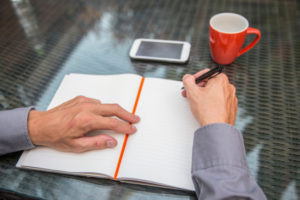And the answer is…
In almost every case I think it’s totally fine to take notes. I have taken notes for 35 years, in more than 3,000 meetings with donors. Not in every meeting, but in the vast majority.
Getting Past “Do No Harm”
 We tend to be cautious in fundraising. We know upsetting a donor can have grave repercussions, and we do almost anything to keep our donors happy. That often means being ultra-conservative in our actions, which is sometimes to our detriment.
We tend to be cautious in fundraising. We know upsetting a donor can have grave repercussions, and we do almost anything to keep our donors happy. That often means being ultra-conservative in our actions, which is sometimes to our detriment.
If we don’t take notes, chances are we will forget or misremember important information. We all know how quickly we forget what we’ve heard. Think of those contact reports we have to write. The longer we wait to write them, the shorter they are. My longest contact reports have always been written the day of the meeting.
Unless you have an extraordinary memory, you can’t possibly remember everything you’ve heard. And, for you young ‘uns, a head’s up that it only gets worse!
When we forget information, we risk misrepresenting a donor’s wishes. We risk forgetting to take important action. And, perhaps worst of all, we forget what we’ve learned and ask the same questions the next time we meet the donor.
Isn’t it Rude?
I’ve heard the argument that it can be off-putting to the donor. That we’re trying to build a relationship and taking notes seems impersonal and business-like. But, in fact, we are in business, and nothing says a business meeting can’t build a relationship.
 Further, if done correctly, the message is one of respect — your desire to remember what your donor is telling you. This holds true for both cultivation and solicitation meetings. In cultivation meetings you’re underscoring how important it is to remember your donor’s background, thoughts, and interests. In solicitation meetings you’re underscoring the meeting isn’t just about asking for the gift.
Further, if done correctly, the message is one of respect — your desire to remember what your donor is telling you. This holds true for both cultivation and solicitation meetings. In cultivation meetings you’re underscoring how important it is to remember your donor’s background, thoughts, and interests. In solicitation meetings you’re underscoring the meeting isn’t just about asking for the gift.
I hope it goes without saying that you definitely shouldn’t be a stenographer, writing down everything that’s said. If you do that, chances are you’re looking down too much and not holding the engagement of your donor. Assume you can write a handful of words every two or three minutes on average. If you have a partner, only one of you should take notes.
I also recommend not using full-sized writing tablets. They can be unwieldly and feel too formal. I have used 5-7″ writing pads forever. The smaller size is more appropriate and less intrusive than a full-sized writing pad. The smaller pads are also more manageable when you’re at a restaurant or coffee shop, where space is at a premium.
Yes, I do still take notes over food and drink, but those notes are fewer and farther apart, and I try to keep the pad on my lap.
Paper vs. Electronic
OK, this might be an age thing, but I would NEVER use electronics in a meeting. Yes, it seems convenient and expedient, but I think it’s distracting to the donor to have you typing away. And I think you will end up distracted by everything else on your phone or tablet (I can’t even imagine a laptop). Also, many people today have negative reactions to people who have their phones out during conversation; it telegraphs lack of interest. You can inadvertently send a very bad message to your donor.
Might this discussion be different five or ten years from now? Possibly, but I don’t think we’re there yet, and bringing electronics into a meeting in any way other than to briefly demonstrate a program through video will most likely be counterproductive.
What if You’re Unsure?
Ask. Ask donors whether they would mind if you took some notes during the meeting. Almost no one will say no, and even some who might have had reservations if you simply pulled out your pad will feel respected to be asked and that alone can get them past their reservations. If you don’t ask, and then you find your donor looking at your hand every time you write something down, take that as a sign to stop. If you feel the rhythm of the meeting is being lost, stop. If you’re out on a call with a partner, only take notes while your partner talks.
At the end of the day, one of the keys to successful fundraising is being able to read donors. You’ve got a great gut instinct, so use it! Don’t worry about breaking one or two eggs to make your omelet. If we do absolutely no harm, we’re probably not doing our jobs. So order those writing pads today!





